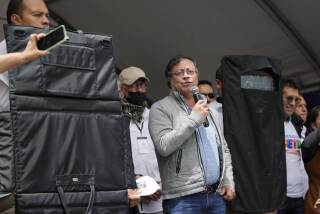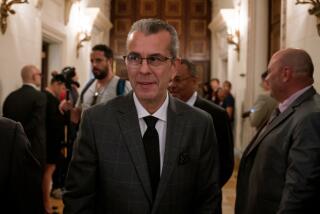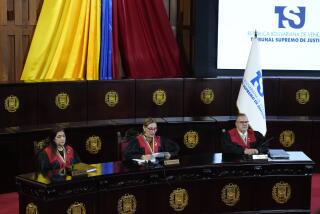Venezuela Referendum on Chavez OKd, Then Overturned by Court
CARACAS, Venezuela — Venezuela’s electoral council agreed Thursday to hold a nonbinding referendum on whether President Hugo Chavez should resign, but the Supreme Court later ruled against the panel’s decision.
The National Electoral Council called the Feb. 2 referendum in a 3-1 vote with one member abstaining, citing a new law allowing approval by a simple majority.
But in its ruling late Thursday, the court said the panel was still bound by an old electoral law requiring approval by four of the five council members.
“The referendum still hasn’t been called,” said electoral council member Romulo Lares, the abstaining member. “That decision is null, according to the Supreme Court’s ruling.”
There was no immediate comment by the opposition.
Chavez’s allies challenged the referendum as soon as it was announced, saying the electoral council had overstepped the law.
Speaking in the southwestern state of Apure late Thursday, Chavez reiterated his view that under the constitution, the earliest a referendum can be held is August -- halfway through his current six-year term.
“I’m not afraid of the referendum,” he said.
More than 200 Chavez supporters protested outside the electoral council Thursday.
On Nov. 4, thousands of government opponents delivered a petition with 2 million signatures demanding the referendum, which would ask whether Chavez should voluntarily resign. Electoral officials said they had verified about 1.2 million signatures -- the threshold needed.
The lone dissenter on the council, Romulo Rangel, said a more thorough check of the signatures was needed.
More to Read
Sign up for Essential California
The most important California stories and recommendations in your inbox every morning.
You may occasionally receive promotional content from the Los Angeles Times.










